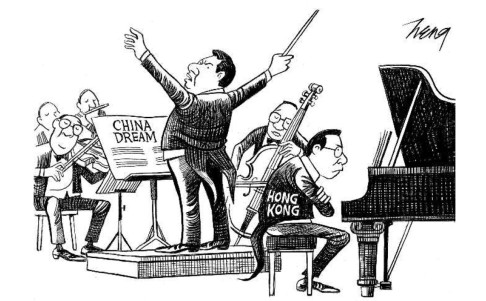
After angry mobs turn on protesters, students call off talks
Violence in Mong Kok and Causeway Bay as police struggle to protect encircled students; 'breakthrough' talks with chief secretary put on hold
Fists flew and tempers frayed as people demanding an end to the Occupy movement clashed violently with protesters in Mong Kok and Causeway Bay.
The Federation of Students and Scholarism - two of the three main groups behind the campaign - put on hold a meeting with Chief Secretary Carrie Lam Cheng Yuet-ngor and blamed police for failing to protect them.
Police struggled to separate the opposing camps and at times were overwhelmed by the riotous crowds who surrounded protesters occupying the junction of Argyle Street and Nathan Road, Mong Kok yesterday. Officers escorted some besieged protesters to safety but the confrontation persisted into the night.
Two arrests were made and dozens of people, apparently Occupy opponents, were taken away by police.
Some 37 people were treated for injuries, bringing to 131 the number of those hurt since the protests kicked off on Sunday.
In a clip uploaded to the government's website last night, Chief Executive Leung Chun-ying urged everyone to leave Mong Kok.
"People should stay calm and not use violent means no matter what side they take on Occupy Central," he said. "I have noticed there are many young people, with some students in their uniforms. I call on them to leave immediately as I do not want to see any citizens get hurt."
Earlier the government had called the behaviour of protesters blocking access to government offices in Admiralty "almost complete anarchy".
Occupy Central and the student groups called for supporters in Mong Kok and Causeway Bay to pull back to Admiralty.
The agreement for the students to meet Lam, a breakthrough achieved late on Thursday, had raised hopes for a solution to the deadlock.
After six days of mostly peaceful demonstrations triggered by Beijing's decision to limit electoral reform in Hong Kong and a heavy-handed police approach on Sunday, the crowds started to thin out yesterday. Stormy weather, fatigue and increasing splits among protesters took their toll. But chaos erupted in Mong Kok at around 2pm when dozens of people, mostly in their fifties, forcibly removed tents and barriers set up by the pro-democracy activists. They soon encircled the protesters, hurling insults and water bottles at them.
Police officers were barely able to control the situation, but no riot police were deployed. Hundreds of people shouted at protesters to "clear out", "go home" and said they "support the police".
Hong Kong Design Institute student Yeung Ching-fung said he was "terrified".
"I am disgusted by their actions. They are in their fifties and should be our role models. But they keep swearing, insulting my family. Is that the right way to express their views?" he asked.
Anti-triad police were deployed in Causeway Bay, where 20 burly masked men harassed protesters. A smaller protest in Tsim Sha Tsui was cleared by police.
Anti-Occupy protester Jackson Tsui, 46, denied belonging to any political party or group. "[The Occupy protesters] are seriously affecting the lives of ordinary Hong Kong people and disrupting traffic. That is why I want them to go home," he said.
Some anti-Occupy protesters said they owned shops and their businesses had suffered greatly.
ANZ, a bank, estimated the protests had cost retailers HK$2.2 billion over the past week, but losses could balloon to HK$6.2 billion if they continued.
In Beijing, state media stepped up its rhetoric, condemning the pro-democracy protests as a challenge to China's "highest authority".
ran a commentary on its front page for the second day, stressing Beijing would never retract its decision on electoral reform and was prepared to "staunchly safeguard the decision". The has also run front-page reports for two straight days on Hong Kong, yesterday highlighting the loyalty of the soldiers stationed in Hong Kong to the Communist Party.


